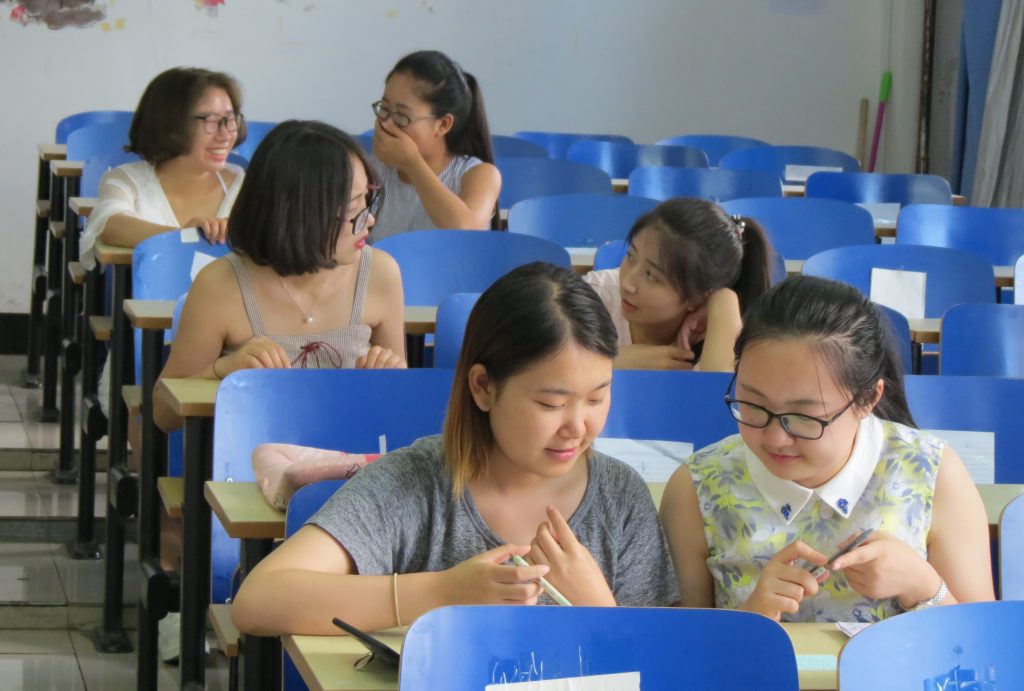Though there really is no standard format for our classes (other than the first period) I do tend to conduct my classes in roughly the same way every day, based on my experience last year. At the same time, oftentimes I will omit an activity I have prepared and substitute something that just popped into my head; sometimes a planned session runs short – or runs too long, and so something is added (usually pronunciation) or truncated.
 On Day 2 Ms. E presented a China Daily story about the surplus of men in China – more than 33,000,000 more men than women. This is one of the unfortunate results of the One Child Policy, instituted about a generation ago (and now significantly relaxed). For a young lady not yet out of college, Ms. E was impressive: I’ve seen many seasoned teachers who could not address an audience so masterfully.
On Day 2 Ms. E presented a China Daily story about the surplus of men in China – more than 33,000,000 more men than women. This is one of the unfortunate results of the One Child Policy, instituted about a generation ago (and now significantly relaxed). For a young lady not yet out of college, Ms. E was impressive: I’ve seen many seasoned teachers who could not address an audience so masterfully.
Back in my room with Class 5, we reviewed the new vocabulary and the students wrote on the chalkboard any (many!) additional words they did not know. Generally, all students will write something; the average is six to eight new words from each.
The thrust of the article is this: while abortion is not illegal in China, it is illegal to use an ultrasound machine to determine the baby’s sex in order to decide whether or not to abort. Due to “feudal mentality” (i.e., the traditional quasi-religious reliance on sons), most children aborted in the last generation have been girls, causing the large surplus of men. Doctors will hide ultrasound machines in stores or homes, or expectant mothers will send blood samples to other countries for the purpose of finding out the sex of the baby. The government now recognizing the problems which attend “gender imbalance”, they seek to crack down on “abuse” of these diagnostic methods.
Not one of my students knew what an ultrasound machine is. I don’t mean that they didn’t recognize the English word; I mean that when I described how it works (likening it to echo-location as used by bats) and what the image looks like, they were clearly intrigued. But just as clearly, no one had any prior knowledge of such a thing.
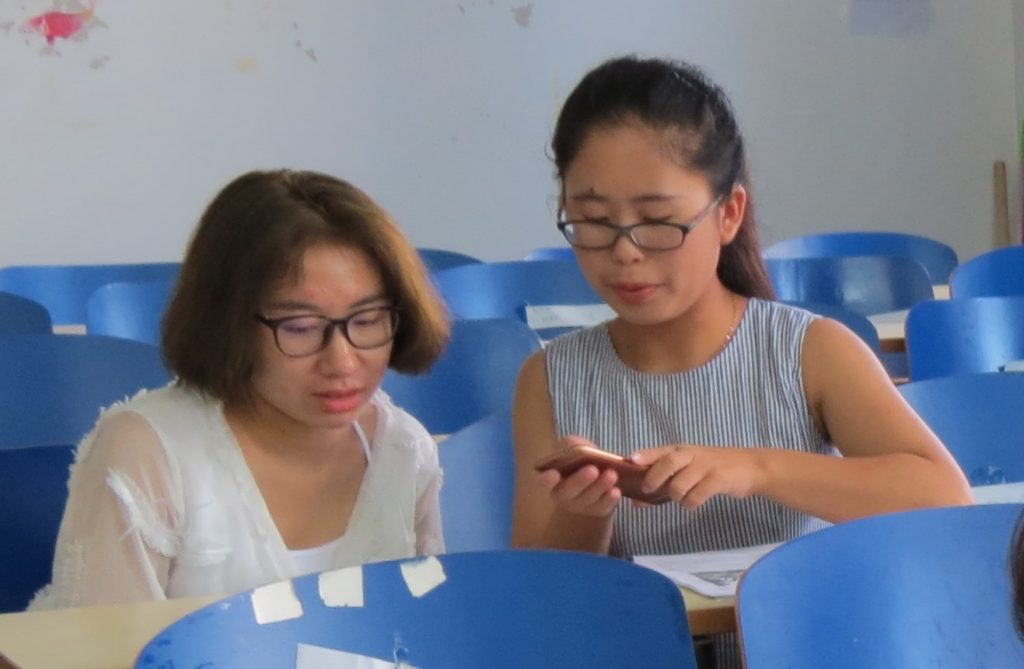 Since this particular article is rather lengthy, we did not read it aloud but moved straight to discussion. I divided the class into four groups (using the Uno cards) and assigned each group a question to talk about amongst themselves and report on to the entire class, giving them about 25 minutes. Since the speaking ability of this group is sometimes very limited, and since it is very early in the program, I permitted them to talk to each other in Chinese and to write down in English, and then read, what they wanted to report. I probably will not permit this with the last two groups I will teach.
Since this particular article is rather lengthy, we did not read it aloud but moved straight to discussion. I divided the class into four groups (using the Uno cards) and assigned each group a question to talk about amongst themselves and report on to the entire class, giving them about 25 minutes. Since the speaking ability of this group is sometimes very limited, and since it is very early in the program, I permitted them to talk to each other in Chinese and to write down in English, and then read, what they wanted to report. I probably will not permit this with the last two groups I will teach.
Having noticed last year that students are uncomfortable speaking alone while standing in front of the class, I had them stand up in their groups, but required each person to say something.
Now, the results of an exercise like this are not always what you would think. Here are the questions I assigned: – Do families really prefer boys over girls? Is this changing? – You are a young man who wants to marry. Do you feel you must “compete” with other men? – What can be done to solve the problem of gender imbalance? – What problems arise from too many “extra” men?
Interestingly, all three students who addressed the first question agreed that in their home provinces, boys are preferred. They did not think this attitude was changing, nor did they seem to think that it should. They also agreed that in the case of two equally-qualified job seekers, they would hire the man.
The students who took the next question performed a dandy little skit in which two men came to blows over a girl, who separated them. One man offered her a heart full of love, the other a big home, a car, and “anything you like”. She chose True Love.
I was quite disappointed in the groups who took the last two questions, and perhaps this was my own fault. I wanted their ideas and opinions, and every one of them read verbatim a conclusion or recommendation written in the original China Daily story.
I then brought up to the front of the room our lone male student, who had played the rejected suitor in the little skit. I praised his qualifications as a marriage prospect (house, car, prestigious job, kind heart, good family, etc.) and asked: what about him? What can he do to find a wife? How can we help him? Oddly, no one volunteered any solutions. I think they were puzzled, and looking back now I think I should have asked the young man what his own thoughts are, since he is directly affected. But since everyone was silent I put forward the idea of emigrating and returning home with a foreign bride…or emigrating, marrying a foreign woman, and not returning home. Students didn’t seem to be certain how serious I was about these proposals, or how realistic they may be. But…they had no ideas of their own. (Unlike last year’s group, whose solution was that every girl would get two husbands!)
Since I had 15 minutes left over, I asked for volunteers to write on the board. I then dictated four sets of “minimal pairs” (words that differ by only one sound). I spoke, and they wrote, words like bin – bean, hit – heat, fit – feet, etc.. Working quickly, everyone had a chance to do this. Most students got no more than five of the eight words correct, which got not only my attention but theirs, too, especially once I pointed out that we were working on the difference between the /ɪ/ (“short i”) and /iː/ (“long e”) sounds.
After lunch I wrote on the board several key vocabulary terms from Day 1 and Day 2. Then each student drew from a box a slip of paper on which was written one word, such as “potato” or “frightened” or “searching”. The idea was to tell a continuous story, with each student adding on to it, in random order. I began the story by giving three short sentences, then tossing a pair of rolled-up socks to the best speaker in the class. She did not continue my story, however. She used her paper and several words from the board to make her own brief statement. Everyone else followed her example, so we did not get the lengthy story I anticipated, though each person did say three sentences employing the new words correctly. As each student finished, I had to coax her to toss the socks to the next speaker…who never thought to catch them. “Unclear on the concept” indeed, though I daresay this may be due to inadequate explanation on my part. I will have to ask Leo or Ms. W whether Chinese youth know how to add on to a story.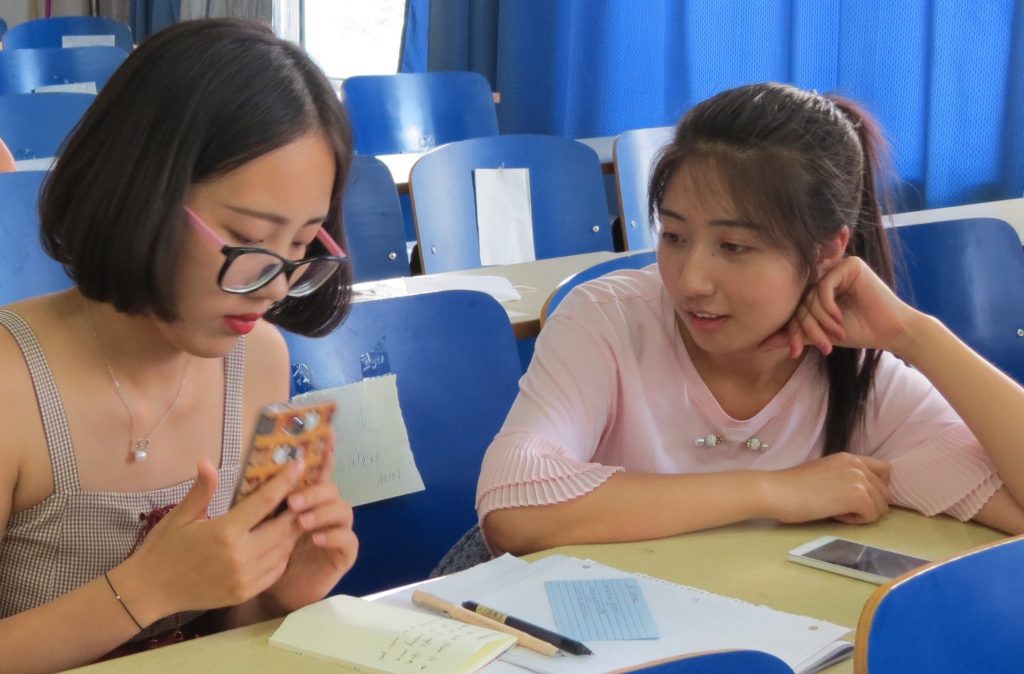
Since the “story” didn’t go over too well, I abandoned the additional pronunciation drill I had in mind in favor of Two Truths and a Lie, which is more fun for everyone. I write three brief facts about me on the board, and students have to decide which is untrue and why. Then each student addresses the class with three statements about himself. While they are nervous, it is a lesser problem than during the discussion period, described above, since they are eager to fool their classmates.
We did have some trouble during the last few minutes, as Ms. E had taken her class outside and they were positioned directly under our window playing a noisy game like pat-a-cake. They were kind enough to let us join them after class; I was the first person “out”, which delighted the students.

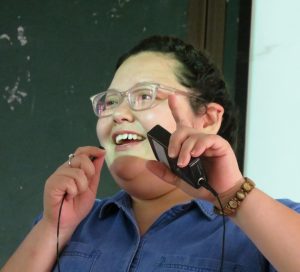



![]()

 Mr. P, one of our younger teachers, told me of the great success he had with his class: each student had to write his own eulogy, then choose another student to deliver it while the “deceased” lay on a bier (three desks pushed together) and the rest of the class served as mourners! He said they were all very enthusiastic – in one case the dead man decided to read the eulogy himself. While I think this is a good assignment as regards writing, speaking, and thinking about oneself and one’s life, I would definitely have hesitated before implementing it, especially in a situation like Jilin where I’m not that familiar with the culture or with the home life of my students.
Mr. P, one of our younger teachers, told me of the great success he had with his class: each student had to write his own eulogy, then choose another student to deliver it while the “deceased” lay on a bier (three desks pushed together) and the rest of the class served as mourners! He said they were all very enthusiastic – in one case the dead man decided to read the eulogy himself. While I think this is a good assignment as regards writing, speaking, and thinking about oneself and one’s life, I would definitely have hesitated before implementing it, especially in a situation like Jilin where I’m not that familiar with the culture or with the home life of my students.
 When we reconvened, it was their turn to do Two Truths and a Lie. Nearly everyone seemed eager to talk. Unlike Class 5, these students don’t seem to need each other’s presence for moral support when standing in front of the entire class. This is probably due to Mr. G assigning them job interviews and such as speaking exercises when he had them earlier in the week.
When we reconvened, it was their turn to do Two Truths and a Lie. Nearly everyone seemed eager to talk. Unlike Class 5, these students don’t seem to need each other’s presence for moral support when standing in front of the entire class. This is probably due to Mr. G assigning them job interviews and such as speaking exercises when he had them earlier in the week.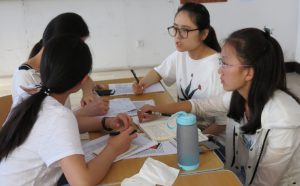


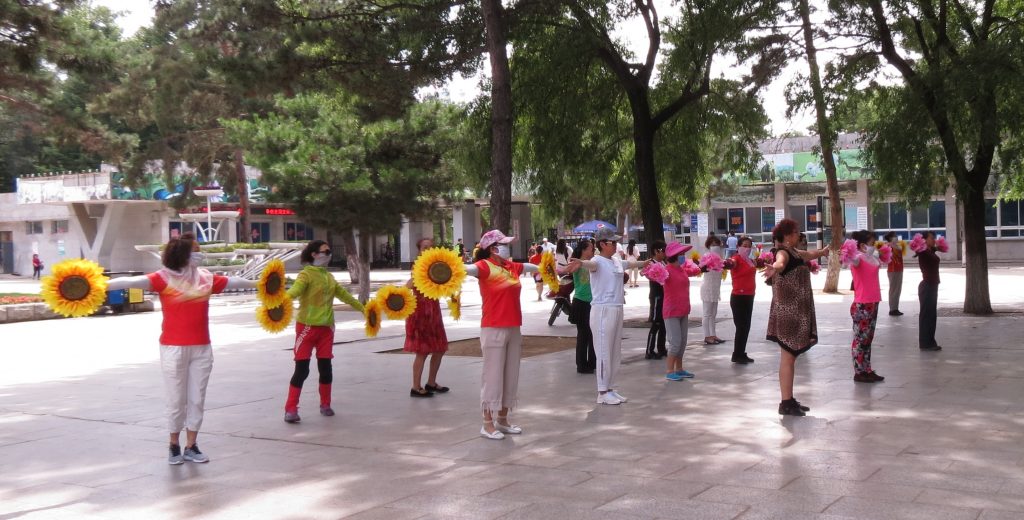
 I commented to my students that these ladies must have colds and are being careful not to make others sick but I was quickly corrected: they cover their faces so as not to get sun-tanned.
I commented to my students that these ladies must have colds and are being careful not to make others sick but I was quickly corrected: they cover their faces so as not to get sun-tanned.

 The park was beautiful – shady and cool, with lovely flowers (all in pots!). It includes long walkways, grassy and forested areas, a small amusement park with a Ferris wheel, bumper cars and such, and even a little zoo with lions, tigers, llamas, a leopard, wallabies, seals, and raccoons. This last reminded me of when I was very young and visited the Bronx Zoo in New York. In those days a zoo was a place where people could look at animals. Today, American zoos are centers of conservation…and by the way, people can come see the animals. Jilin’s Zoo is like the Bronx Zoo of my childhood: cages and water dishes, and not much in the way of “habitat”.
The park was beautiful – shady and cool, with lovely flowers (all in pots!). It includes long walkways, grassy and forested areas, a small amusement park with a Ferris wheel, bumper cars and such, and even a little zoo with lions, tigers, llamas, a leopard, wallabies, seals, and raccoons. This last reminded me of when I was very young and visited the Bronx Zoo in New York. In those days a zoo was a place where people could look at animals. Today, American zoos are centers of conservation…and by the way, people can come see the animals. Jilin’s Zoo is like the Bronx Zoo of my childhood: cages and water dishes, and not much in the way of “habitat”.





 The specialty of the region is called Hotpot, and consists of some kind of broth or seasoned water brought to a boil in a shallow pan at your table. Then various meats, noodles, and vegetables are brought and you drop them in and take them out as you fancy. The students also ordered some kind of cold noodle and soup concoction that was surprisingly good, some very spicy kimchee-like veggies, and “char” — which is meat, fish cakes, or egg-roll-like foods that have been grilled on skewers. Two students ran to the nearest grocer to bring a 2.5 liter bottle of Seven-Up (the restaurant doesn’t mind if you bring in drinks).
The specialty of the region is called Hotpot, and consists of some kind of broth or seasoned water brought to a boil in a shallow pan at your table. Then various meats, noodles, and vegetables are brought and you drop them in and take them out as you fancy. The students also ordered some kind of cold noodle and soup concoction that was surprisingly good, some very spicy kimchee-like veggies, and “char” — which is meat, fish cakes, or egg-roll-like foods that have been grilled on skewers. Two students ran to the nearest grocer to bring a 2.5 liter bottle of Seven-Up (the restaurant doesn’t mind if you bring in drinks). 
 It was quite a merry little party, to which I was not permitted to contribute anything but my presence and my admiration. This generosity is typical of Jilin students and, in my experience, of everyone we have met in Maryknoll, the university, and the hotel.
It was quite a merry little party, to which I was not permitted to contribute anything but my presence and my admiration. This generosity is typical of Jilin students and, in my experience, of everyone we have met in Maryknoll, the university, and the hotel. On Day 2 Ms. E presented a China Daily story about the surplus of men in China – more than 33,000,000 more men than women. This is one of the unfortunate results of the One Child Policy, instituted about a generation ago (and now significantly relaxed). For a young lady not yet out of college, Ms. E was impressive: I’ve seen many seasoned teachers who could not address an audience so masterfully.
On Day 2 Ms. E presented a China Daily story about the surplus of men in China – more than 33,000,000 more men than women. This is one of the unfortunate results of the One Child Policy, instituted about a generation ago (and now significantly relaxed). For a young lady not yet out of college, Ms. E was impressive: I’ve seen many seasoned teachers who could not address an audience so masterfully. Since this particular article is rather lengthy, we did not read it aloud but moved straight to discussion. I divided the class into four groups (using the Uno cards) and assigned each group a question to talk about amongst themselves and report on to the entire class, giving them about 25 minutes. Since the speaking ability of this group is sometimes very limited, and since it is very early in the program, I permitted them to talk to each other in Chinese and to write down in English, and then read, what they wanted to report. I probably will not permit this with the last two groups I will teach.
Since this particular article is rather lengthy, we did not read it aloud but moved straight to discussion. I divided the class into four groups (using the Uno cards) and assigned each group a question to talk about amongst themselves and report on to the entire class, giving them about 25 minutes. Since the speaking ability of this group is sometimes very limited, and since it is very early in the program, I permitted them to talk to each other in Chinese and to write down in English, and then read, what they wanted to report. I probably will not permit this with the last two groups I will teach.

